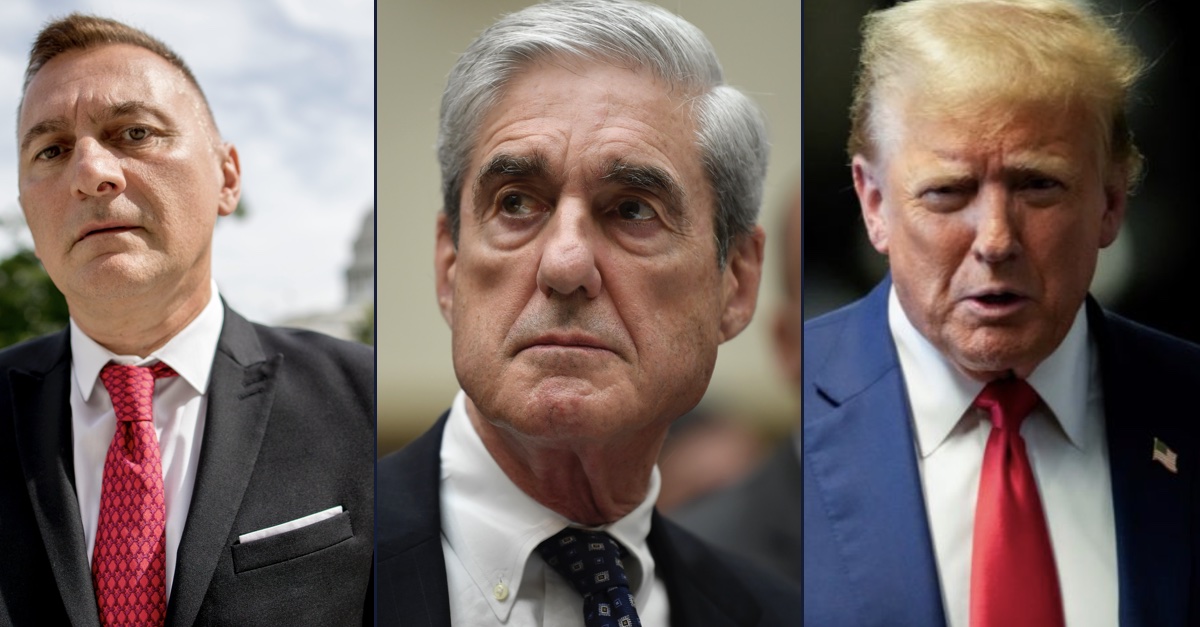
Left: Giorgi Rtskhiladze, a former business partner of President Donald Trump, poses for a portrait as he arrives for a closed door meeting with the House Intelligence Committee in 2019 (AP Photo/Andrew Harnik). Center: Former special counsel Robert Mueller testifies in 2019 (AP Photo/Susan Walsh, File). Right: Donald Trump speaks to members of the media in Manhattan (AP Photo/Julia Nikhinson, Pool).
A Georgian-American businessman referenced in special counsel Robert Mueller’s report on Russian interference in the 2016 election in the context of texting former Donald Trump fixer Michael Cohen about stopping the “flow of some tapes from Russia” — which was widely believed to refer to the so-called “pee tape” of Steele Dossier infamy — can sue the DOJ for falsely calling him a Russian and for misquoting him, potentially forcing a retraction, a federal appellate court ruled Friday.
The unanimous opinion of the U.S. Court of Appeals for the D.C. Circuit, led by U.S. Circuit Judge Justin Walker, a former clerk to Brett Kavanaugh at the same appellate court, concluded that Giorgi Rtskhiladze was correct about the inaccuracies of a footnote in Mueller’s report and that the Senate Intelligence Committee’s separate investigation, which fixed those mistakes, did “not extinguish the harm from [the] earlier government report.”
Footnote 112 from Volume II of the Mueller report falsely identified Rtskhiladze as a “Russian businessman” and misquoted a text he sent Cohen in October 2016, the court noted.

The Mueller footnote recounted how former FBI Director James Comey briefed Trump on the “unverified allegation” in the Steele Dossier “that the Russians had compromising tapes of the President involving conduct when he was a private citizen during a 2013 trip to Moscow for the Miss Universe Pageant,” tapes that Rtskhiladze would later say he believed were “fake.”
According to the footnote, while Rtskhiladze said “‘tapes’ referred to compromising tapes of Trump rumored to be held by persons associated with the Russian real estate conglomerate Crocus Group, which had helped host the 2013 Miss Universe Pageant in Russia,” Michael Cohen said “he spoke to Trump about the issue after receiving the texts from Rtskhiladze.”
“Rtskhiladze said he was told the tapes were fake, but he did not communicate that to Cohen,” the footnote continued.
In his lawsuit against Mueller and the DOJ, Rtskhiladze maintained that the difference between “stopped flow of tapes” and “stopped flow of some tapes” was subtle but important, because the word “some” conveyed “a lack of familiarity with their content.”
According to the D.C. Circuit, Rtskhiladze had argued the identified “deficiencies” in the Mueller report “harmed his reputation and cost him several business deals — not the least because footnote 112 garnered widespread media attention.”
“He also alleges the deficiencies altered the Georgian government’s plans to name Rtskhiladze an ‘Honorary Consul,’ which fell through after the report’s release,” the ruling said.
For the D.C. panel, including Walker, Chief U.S. Circuit Judge Sri Srinivasan, a Barack Obama appointee, and U.S. Circuit Judge Florence Pan, a Joe Biden appointee, the lower court wrongly tossed out Rtskhiladze’s claim for equitable relief for lack of standing. In reality, the Mueller report portion pertaining to Rtskhiladze has not been corrected and the Senate Intelligence Committee’s report did nothing to change that fact — but a court can force the correction, so Rtskhiladze has standing.
“So the Mueller Report could continue to harm Rtskhiladze in at least two ways. First, someone may find the Mueller Report but not the Senate Report — in which case the Mueller Report would still cause Rtskhiladze’s alleged injury,” Walker wrote. “Alternatively, readers of both reports may continue to believe Mueller. After all, Congress neither speaks for DOJ, nor speaks infallibly. Either way, a court could redress the ongoing injury by ordering DOJ to correct the Mueller Report.”
“In other words, the alleged and ongoing injury is traceable to DOJ’s Mueller Report, and it could still be redressed by an order to correct it,” Walker continued.
In addition, the panel found that Rtskhiladze did having standing to seek monetary damages for “alleged injuries suffered before the Senate Report’s release” and after, but said the district court was still right to find that Rtskhiladze “failed to state a claim for which relief can be granted.” Thirdly, the D.C. Circuit found the lower court did not abuse its discretion when it ruled Rtskhiladze was “not entitled to obtain a copy of his grand jury transcript.”
When Law&Crime reached out to Rtskhiladze’s appellate lawyer Jerry Madden for comment, he said he was “disappointed” by the D.C. Circuit’s dismissal of the damages claim and the ruling on the grand jury transcript copy.
“We are considering whether to ask the full court to rehear those issues,” he said.
Madden said that Mueller report footnote “caused massive financial harm to my client,” as it “raised the prospect that salacious videos of Mr. Trump—the so-called ‘golden rain’ tapes—did exist and were suppressed in Russia by my client before the 2016 presidential election.”
“The implications of Footnote 112 as it relates to Mr. Rtskhiladze was wildly untrue. We alleged that a certain member or members of Special Counsel Mueller’s team of prosecutors had both motive and opportunity to write that footnote in a way that implied the tapes existed and were being suppressed, intended to harm Mr. Trump’s election prospects,” Madden said. “All at the expense of my client’s reputation. And not providing him with a copy of his grand jury testimony is patently unfair because Footnote 112 misquoted parts of his testimony.”
“To the extent grand jury transcripts are confidential, the government forfeited that confidentiality when it misquoted his testimony to make it appear he had knowledge of the purported tapes and took active steps to suppress them,” he added.
On the equitable relief claims, Madden said it was clear to him from the get-go that the district court ruling was an “anomalous result.”
“The issuance of another government record—the Senate Report—that did not defame Mr. Rtskhiladze does not make the defamatory information in Footnote 112 somehow ‘accurate’ and ‘complete’ within the meaning of the Privacy Act,” he told Law&Crime. “If that reasoning were correct, then Dominion Voting Machine’s defamation case against Fox News should have been dismissed because CNN subsequently stated on the air that Dominion’s machines were not part of a conspiracy to steal the election. Or, where The New York Times defamed someone, the fact that The Washington Post, a year later, covered the same subject but did not defame that person, the Post article would mean that Times received a get out of jail free card.”
“Of course, the reasoning is hopelessly flawed,” Madden concluded.
Read the D.C. Circuit ruling here.
Have a tip we should know? [email protected]







